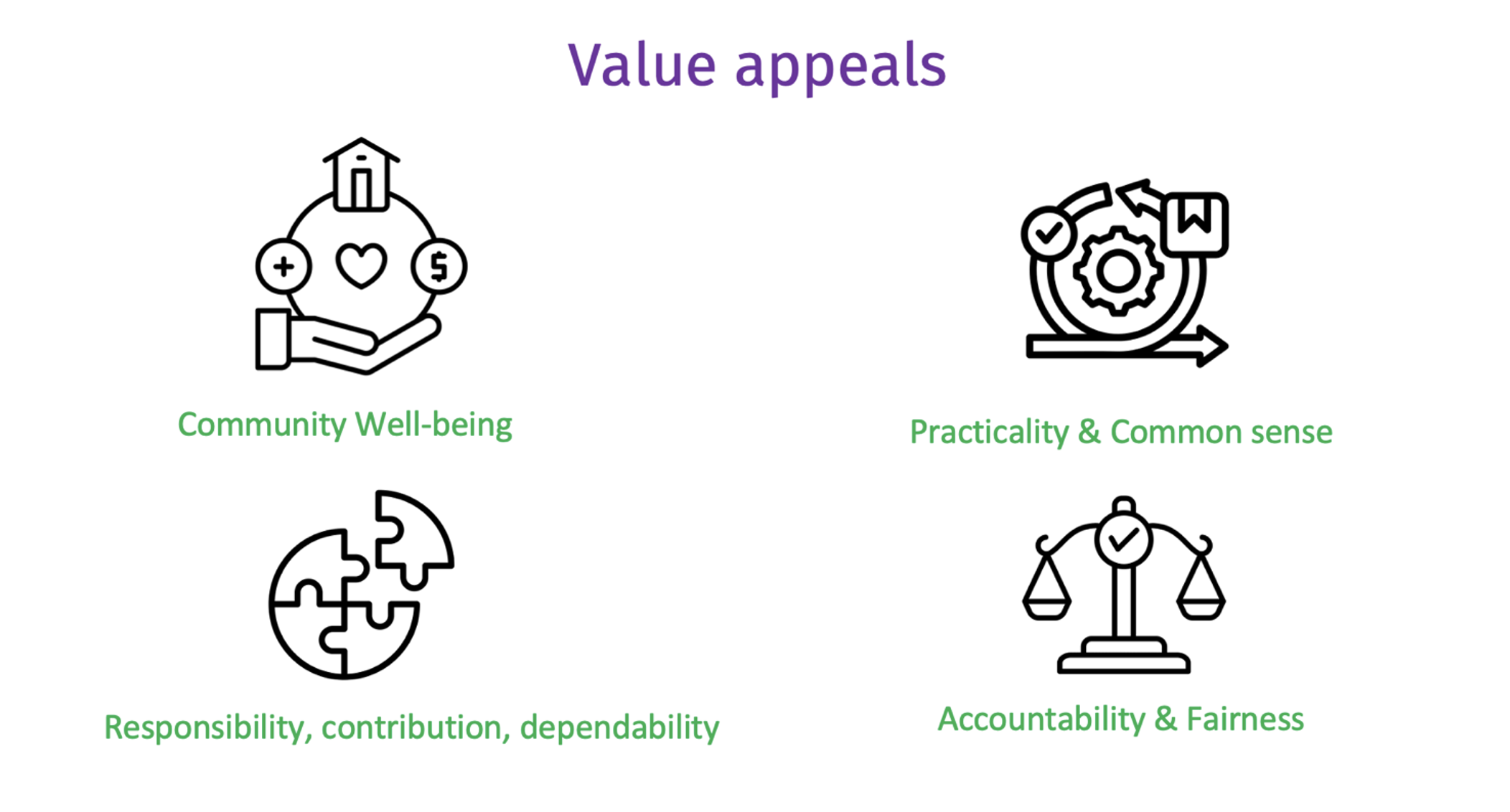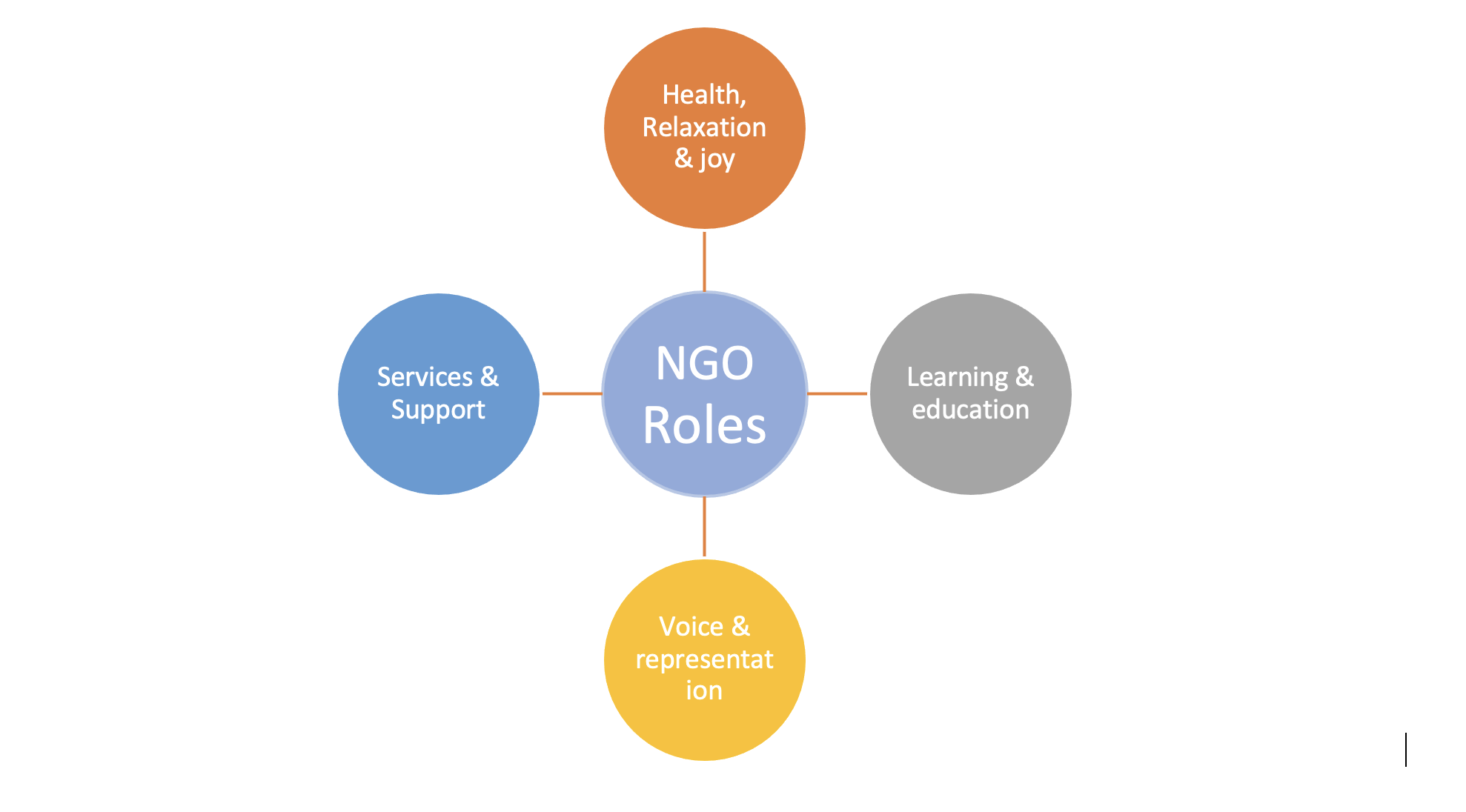Section 6 - Community Well-Being reframe of the NGO sector
Building on the mapping stage (of the debate and the target audiences) and a narrative development and testing process (following the approach detailed in our toolkit), we developed a messaging approach that successfully immunises the Detached segment against extremist conspiracy thinking about NGOs [See Section 5]. This chapter details the community well-being reframe of the NGO sector that is the immunising messaging approach.
6.1 The key drivers of the reframing/messaging approach
| a. Build on unifying value appeals | b. Build on recognisable community challenges, responses & aspirations | c. Expand understanding of the role of NGOs |
| d. Explain the NGO sector roles in metaphors | e. Introduce the term NGOs to act as a stepping stone to an expanded view of the sector | f. Bring the values to life through authentic storytelling |
Breaking these down:
a. Unifying Value Appeals
The value appeals that underpin the messaging approach are as follows:

Figure 13: Value appeals driving the community well-being messaging
Quoting from our #KommMit toolbox on a value-based approach: “effective communication with the goal of changing attitudes is never just about facts on the issue; rather, finding value appeals that mobilise and open the door to a constructive debate with various audiences is key”. We can’t understate the importance of this set of value appeals, as they become the guide or NorthStar for all the comms that follow. It’s important to point out this set of value appeals is the bridge that unifies the Detached and what we have assumed that NGOs will feel happy also to message on.
b. Building on shared challenges and aspirations that resonate
From the focus groups, we were able to identify the most common challenges that came up from the target groups and identify the shared challenges that need to be overcome to deliver well-being at the core of the messaging. As with the values, we are not trying just to please the audience, but also find those challenges we also agree need to be tackled and are felt at the community level. The challenges we identified are:
- Rising rents
- School life after the pandemic
- Employment
- Caring for elderly relatives
- Pension planning/security
- And a more general challenge: getting off the hamster wheel from everyday stress and social media bubbles.
c. Expanding the role of NGOs & Civil Society
One of the main challenges we could see in the mapping period was a reductive view of NGOs where providing support and charity is considered good and playing roles in politics is seen as bad, close to ‘lobbyism’ and a type of corrupt self-interest. Therefore, a key part of the reframing was to widen out the understanding of the variety of NGOs and civil society organisations fulfilling a wide range of roles beyond this limited perspective. The following diagram illustrates the expanded roles that underpin the messaging approach:

Figure 14: Expanded roles of NGOs in the messaging approach
d. Explaining the NGO sector in metaphors
As the concept of NGOs and civil society is quite blurry for the target segments, we also tested a number of explanatory metaphors. Frameworks Institute use a metaphorical approach and explain that metaphors help compare something abstract to something familiar which opens a door to understanding1
. Building on a number of sources that have messaged in this space, the metaphors that we used and worked are as follows:
- Construction: NGOs acting to build, protect and maintain community well-being2
- Bridge: NGOs as an important pathway for community action on issues of concern
- Choir: NGOs as the organiser to empower the community to express their position in unison3
e. Introducing the term NGO – a stepping stone to an expanded view of the sector
Through all stages of the project, it was clear that the target middle segments have very vague notions about civil society and its role in a democracy, and indeed are challenged when discussing such conceptual notions. The more common German term is NPO (non-profit), but this term tends to trigger a whole negative discussion around funding, trust and corruption. In addition, these segments don’t tend to see big charities, associations/clubs and other types of NGOs as part of the same group. So, we needed a new term to bring these organisations together under one umbrella and give the new expanded view a name. Although the term NGO is more of an English term and is not so well known, we saw in the focus groups that it can function as a pillar of meaning making, a stepping stone into the expanded view the sector that included all types of organisations and the expanded roles listed above.
f. Bring the values to life through authentic storytelling
In this resource, we have worked on a set of tested messaging to guide those wishing to immunise those on the right against conspiracy thinking about NGOs. However, a follow up step is needed: the built out of stories to illustrate and bring the values in the messaging to life in an authentic and engaging way. Following a value-based approach, this is an essential element and as we always say, the stories are the connective tissue between the values and the issue discussion we are targeting. See examples of effective civic space story telling in our Safeguarding Civic Space Guide.
6.2 The messages that reframe the NGO sector around community well-being
The topline/guiding messages that worked are as follows:
- NGOs work to maximise community well-being and human potential through the stages of life
- We can count on NGOs to work well for all
Taking these topline messages and building on all the drivers above, we develop a set of detailed and tested messaging that works to immunise the Detached. The set of messages includes:
- 2 that speak to an expanded overall view of the sector and;
- then 3 messages that focus on 3 more specific roles for NGOs that test well.
This section introduces the messaging, explains why they work, and details the evidence to support our claims and the risks/adaptations that might be needed. These messages could be used or adapted for campaigning and project work, and even more everyday face-to-face, explaining or pitching the work of an NGO to similar sceptical audiences.
Expanded overall NGO roles messaging x 2
| 1 | Expansive role of NGOs | For decades NGOs such as charities, immigrant support associations, youth and sports clubs run by dedicated community members have been supporting our communities. They give us a voice when issues arise and create opportunities for learning, growth, health and relaxation. |
Value appeals
|
Why this works?
- Shows the expansive and long-term roles played by the sector in protecting and promoting community well-being (including, but not limited to supporting the needy).
- Good balance of resonance in the grounded, community aspirations and also adding the potentially more dissonant ideas of giving voice when issues arise (i.e. more political) and including immigrant support organisations alongside other types of organisations
- Explains and illustrates the expanded view of the sector with a wide variety of recognisable organisations
- Appeals to the idea that local people with practical knowledge are at the heart of the work, i.e. how the Detached view competency.
Evidence
- Message Testing Survey: This statement got a mean response of 6,5 among the Detached and 6,6 from the all respondents, i.e. strongly in the ‘Tend to Agree’ level of agreement.
- Focus Groups: This statement brought responses that discussed community support, tolerance, cohesion and praise for committed community members giving their time and bringing their expertise.
Risks/Adjustments
- This messaging will get stronger positive responses if supported with authentic and recognisable stories of NGO work in this area that bring the values to life. For example, in the focus groups with the Detached, organisations like Sozialverband (National social support agency), Lohnsteuerhilfeverein (tax advising associations), Sports clubs, Meterschutzverein (tenants associations) were brought up as good examples as part of this discussion.
| 2 | Weather the storms | These days, many of us are facing similar challenges: rising rents, school life after the pandemic, caring for elderly relatives or planning for retirement. NGOs advise and support us to weather these storms so that we can fulfil our potential by promoting education, solidarity and better access to services. |
Value appeals
|
Why this works?
- Builds resonance on recognised shared challenges among the Detached
- Expands understanding of the roles played by the sector in supporting well-being, though education, solidarity and access to services towards a brighter future.
- Help for self-help – providing advice and guidance to people to have agency and help themselves is a recognisable role of the sector by the Detached and also fits into their notions of the importance of self-reliance and independent action.
- The construction/shelter metaphor around help to ‘weathering storms’ provides an accessible explanation of the role of NGOs.
Evidence
- Message Testing Survey: This statement got a mean response of 6,1 among the Detached and 6,2 from the all respondents, i.e. just over the border into the ‘Tend to Agree’ level of agreement.
- Focus Groups: This statement brought responses that discussed community support and solidarity, protection and safe zones and volunteers helping out, filling gaps and NGOs providing valued guidance.
Risks/Adjustments
- The list of challenges at the start could be adjusted to suit the intended age group/stage of life. For example, the current ones work well for more middle aged and older groups.
- This messaging will get stronger positive responses if supported with authentic and recognisable stories of NGO work in this area that bring the values to life. Some questioned whether the level of support provided from the sector, so these illustrative and engaging stories are very important.
Expanded specific NGO roles messaging x 3
| 3 | Health & Relaxation | Sometimes we need a break from the stress of everyday life, the hamster wheel and social media bubbles. Whether youth clubs, choirs, sports clubs or hiking groups, they offer a chance to get back to simple things, relaxing, exercising, being creative and simply chatting with our friends and neighbours. These e.V.s are all NGOs that have long promoted the well-being of our communities and remain important building blocks for this. |
Value appeals
|
Why this works
- Triggers feelings of warmth through community and brings out many positive memories.
- Switching off from social media and finding the time for an ‘innerlife’ are seen as important aspirations.
- Expands understanding of the roles played by the sector in being the facilitator and protector of valued individual and community targets of health, exercise and relaxation. This link is a very positive association.
- The nostalgia appeal of getting back to the simpler things in life also brings out strong positive stories and feelings.
Evidence
- Message Testing Survey: This statement got a mean response of 6,2 among the Detached and 6,2 from the all respondents, i.e. into the ‘Tend to Agree’ level of agreement.
- Focus Groups: This statement brought responses on the importance of taking a break from everyday stress and the importance of NGOs role in providing these opportunities. In addition, it triggered stories of positive nostalgic stories of having the chance to talk to friends and neighbours and enjoy outdoor life in many ways.
Risks/Adjustments
- We tried this statement out with an exclusive focus on allotment gardens and this split opinion, with many seeing them as places of strict rules and community competition. So, adjusting the list of types of groups detailed in the message based on your knowledge of the target may be useful.
- This messaging will get stronger positive responses, if supported with authentic and recognisable stories of NGO work in this area that bring the values to life.
| 4 | Services & Support | Whether children, elderly people, the disabled, refugees or the homeless - NGOs such as charities and associations are there with guidance and support for individuals, families and communities, as they navigate through the tough times to building the foundations of a stable future. |
Value appeals
|
Why this works?
- This is the recognised positive role for civil society among the Detached and this message gets positive responses in the sectors role in helping the needy.
- Expands understanding of the role played by the sector even in this support role with its focus beyond the individual to the community and also beyond just filling a gap in basic needs to being a guide to the first steps to a better/more stable future.
- Help for self-help – by focusing guidance through the tough time to a better future, there is a recognised and positive view of the role of NGOs providing consultation to help people to help themselves. This fits into the Detached notions of the importance of self-reliance and independent action.
Evidence
- Message Testing Survey: This statement got a mean response of 6,2 among the Detached and 6,4 from the all respondents, i.e. into the ‘Tend to Agree’ level of agreement.
- Focus Groups: This statement brought responses on the need to support those in need and the good work done by the sector in this regard at community level. There was also a focus in the dicussion on the value of guidance and expertise to help people take the next steps.
Risks/Adjustments
- This messaging will get stronger positive responses if supported with authentic and recognisable stories of NGO work in this area that bring the values to life. And especially important with this message, as they do question how much of this support work is done by NGOs. For example, the Kinderschutzbund4 was brought up as a good example in focus groups.
| 5 | Right to Protest | We need to tell our politicians what moves our communities, whether it’s about jobs, pensions or rising rents. That’s why we value the right to protest in Germany. NGOs often serve as a bridge to pool these concerns and unite our voices, so that decision makers will listen and take responsibility to act in the interests of the community. |
Value appeals
|
Why this works?
- Brings out a positive reaction on the use of protest to push for accountability.
- Good balance of resonance in the recognisable everyday challenges and the aspirations for voice and also adding the more dissonant ideas of public protest (i.e. more political).
- Successfully reframes protest as a long-held tradition in Germany to push for accountability and away from broad scale anger at what these segments call ‘extremism’ of recent protests by environmentalists like the ‘Klima Kleber’ and around Covid.
- Elicits a positive role for NGOs as valued and informed organisers and uniters in responding to community concerns
- The bridge metaphor works well to explain this NGO role as a conduit from the people to the politicians.
Evidence
- Message Testing Survey: This statement got a mean response of 6,0 among the Detached and 6,3 from the all respondents, i.e. on the border of the ‘Tend to Agree’ level of agreement.
- Focus Groups: This statement brought responses on being stronger together and the value of protest to tell politicians they are going in the wrong direction, when they are not aware. And also stories of stronger protest organisations in Germany like trade unions and pride in the tradition of protest.
Risks/Adjustments
- The Detached see the protests around Covid and environmental protests by Fridays for Future and ‘Klima Kleber’ (environmental protests led by the Last Generation) negatively and examples of more extremist behaviour. These examples can backfire.
- The language of ‘pressure’ and ‘demands’ for accountability seems too aggressive for the Detached and can also bring negative responses, whereas the idea of opening dialogue towards consultation with political leaders works well.
- This messaging will get stronger positive responses if supported by authentic and recognisable stories of NGO work in this area that bring the values to life.
| Messaging Brief: 2-page summary version |  |
<-- Section 5 - Immunising | Section 7 - About the guide -->
- 1Frameworks Institute (2020) Tapping into the Power of Metaphors.
- 2Frameworks Institute (2015) Talking Human Services. Frameworks Institute Memo.
- 3Choir & Bridge metaphors were suggested in Israel Butler, Liberties (2021) How to talk about civic space: a guide for progressive civil society facing smear campaigns
- 4 kinderschutzbund website